Silver Screenings Archive

Silver Screenings is a collection of thoughts regarding film, television, or anime. Typically I'll discuss narrative themes, though I'll also dabble in discussing more technical concepts such as direction and cinematography.
It's strange that it would take so long for me to watch an anime like Claymore, whose components are so precisely within my interest level. Unfortunately, the only thing holding it back are the adherence to exhausting shounen-fighting story-telling methods.
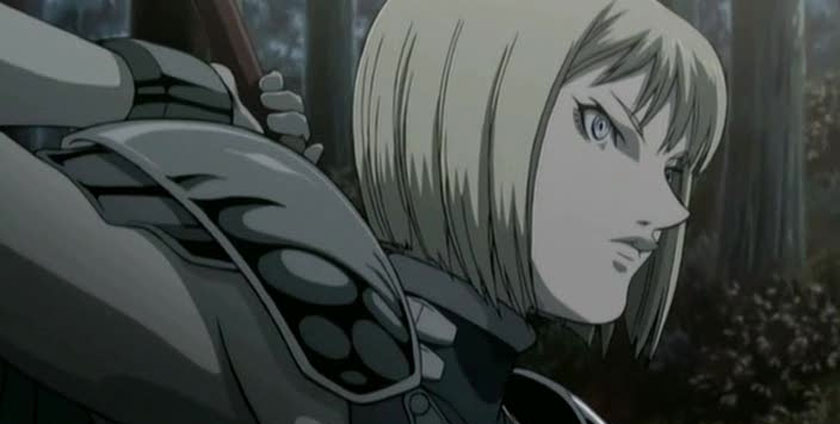
It’s a mystery why it has taken so long for me to watch and read Claymore. I’ve been hunting for high fantasy anime that can scratch the same itch as the original Record of Lodoss War OVAs for years, and while Claymore is more shounen-fighting style dark fantasy, it leans closer to my craving than most Isekai or video game influenced anime currently being produced. Perhaps I missed the day my university’s anime club had played the introductory four episodes, assuming they had shown it at all, but this show has only been on the fringes of my anime radar. I’d occasionally see it on streaming services, but for some reason I never gave it a watch.
However, as much as I enjoyed finally watching the anime and reading the manga, I certainly found the earliest arcs of the narrative more enjoyable than the latter. This has less to do with the quality of the characters or plot and more to do with the prominence of that shounen-fighting sub-genre in which this story occupies. In fact, I have Claymore to thank for helping me understand why I have lost interest in arguably the most popular anime and manga genre: shounen-fighting stories are exhausting.
If you’re not quite certain what I mean by “shounen-fighting”, I’m referring to works such as Dragon Ball Z, Naruto, Bleach, and My Hero Academia. Much like a Kung-Fu flick, the primary draw to these works are the fights. Unfortunately, the pace of these stories is to primarily focus on fights or training arcs with barely any reprieve. All plot and character development occurs while fists and blades are clashing, or while protagonists are endeavoring to develop some new technique or surpass the current limit of their power. Once one phase ends, the next must begin. The bulk of all narrative is in the fighting, posturing, or training. If you’re lucky, there’s an episode where the characters visit a ramen shop or something, though you’re more likely to just get a beach episode these days.
By the time I was in College and Naruto was the new hotness, I found this formula to be tiresome. Now that I’m an adult, I find it outright exhausting and the one thing holding Claymore back from “surpassing its limit”.
Despite its pedigree, Ghost in the Shell: SAC_2045 is more interested in the style of the franchise than it is in the potential substance.
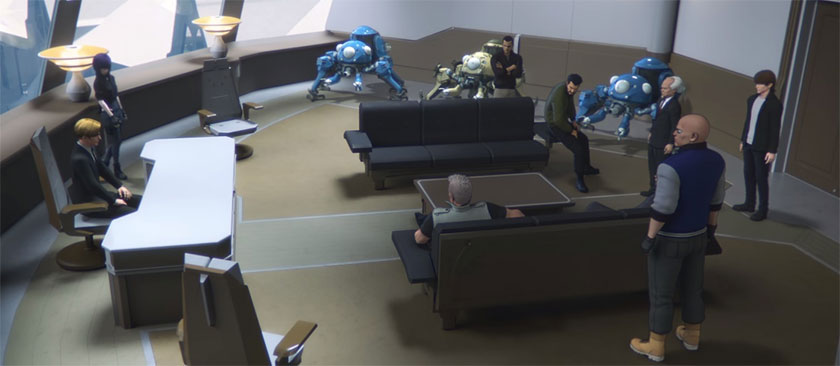
I don’t know where I stand in regards to the notion that Western corporations are starting to put their fingerprints all over the Japanese anime industry. It’s not like there’s a complete lack of evidence or sources, but aside from the hefty bags of money companies like Netflix and Crunchyroll use to persuade studios to make what they want, it’s uncertain whether they’re having a visible impact into how the shows are made. I already have a healthy distrust of Western translation of video games, anime, and manga due to the “I Made This” attitude of many of the industry’s translators, masquerading liberal reinterpretation and modification as “localization”. Of course, that is an incendiary topic all its own, and one filled with ignorant arguments and perspectives on “both sides” of the fence (which, like so many things these days, shouldn’t even be about “sides”).
Intricacies of localization and arguments of accuracy aside, Ghost in the Shell: SAC_2045 is just one of those shows that leaves me wondering whether it has such Western meddling involved due to such additions as one particularly pink-haired member: Purin Esaki. I’d say that she is the Jar Jar Binks of the show, only I feel as if my meaning would be too misunderstood. It’s more like she’s a character from the Star Wars sequel series dropped into the straight-laced world of Star Trek: The Next Generation, there to appeal to the young crowd and their TikToks and Instant Grahams. She’s also super special and magically talented with computers and hacking because of course she is. Everything about her screams “audience self-insert” in a way that feels out of place for Ghost in the Shell: SAC_2045.
Which is a shame, because in the latter half of the series, she could have been a far more suitable exploration of Ghost in the Shell’s best themes.
This essay will immediately go into some pretty big spoilers for the show, so be alert in case you plan to read onward.
A spoiler-lite examination into the anime Hi-Score Girl and how it presents love as an emboldening force to better oneself.
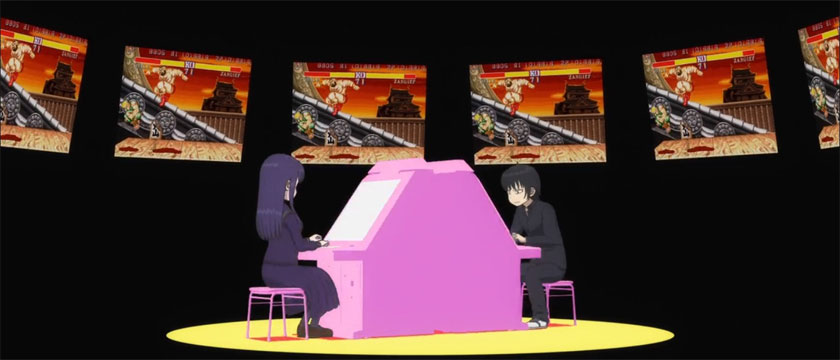
Hi-Score Girl’s alluring seduction comes first and foremost from its nostalgic representation of 1990’s arcade games. Granted, those rose-tinted goggles are specifically fit to peer into the past of Japan’s arcades rather than America’s, but many children and teenagers of the 90’s will revel in the excitement and thrill of competitive Street Fighter II and the evolution that fighting games would experience throughout the decade.
However, viewers will also have to endure the constant and feverish narration of protagonist Haruo Yaguchi. The young, shameless slacker speaks at a million words a minute and with such intensity that it can be a rare exercise in mental exhaustion just to watch more than a few episodes. If you’ve selected the original Japanese voices, that is. I’ve no clue how the English dub sounds and doubt I’ll be finding out anytime soon. Regardless, initial impressions of Haruo are not exactly positive, as he seems like a somewhat greedy, ignorant child, and definitely not the sort to find himself embroiled in a youthful love triangle.
Only he does, and no doubt many will wonder just how he finds himself in such a situation given how clueless he seems to be regarding thoughts of romance and love. That, however, is part of the magic of Hi-Score Girl. By the end of the third episode you’ll be struck in the gut to see how cruel fate can be. Episode four then shifts perspective to a far more calm and soft-spoken character’s inner monologue to not only provide reprieve from Haruo’s high speed chatter, but to better understand his appeal. It would be a mistake to confuse Hi-Score Girl with any other average love triangle romantic comedy, though. Our protagonist may start out as an immature child – what with being a child and all – but through the course of the series, the audience will watch him grow, mature, and improve himself little by little.
All because he never even realized he had fallen in love at such a young age.
I will look for any excuse to talk about this show. In fact, I'm going to use the fact that I spoke about it on a podcast as an excuse to discuss it further here on my blog.
I was invited onto a podcast to discuss the first season of My Teen Romantic Comedy SNAFU!, a rather unfortunate name for a series far more intelligent than its title would suggest. However, it is properly misleading since even some of the light novels are graced with a degree of cheesecake to lure unsuspecting viewers in. It is an unfortunate double-edged sword, where the audience that would likely find the greatest appeal might be dissuaded to watch due to the title, whereas those looking for something more average will be surprised to discover substance.
Some may recall that I had written about this show once already, just before the final two episodes had first aired. I’ve since watched it a second time, and viewed the first season a third time for the sake of my colleague’s podcast. I’ve learned a lot more about these characters during these viewings; what makes them tick, and what makes them interesting.
Despite a two hour conversation on just the first season, I have notes of character quirks, lines of dialogue, and potential themes that I was not able to thoroughly address during our recording. As such, I hope to address them now: in particular, Hachiman Hikigaya’s and Yukino Yukinoshita’s conflicting perspective on change, and how the former’s attitude gradually begins to shift.
Thrice Upon a Time concludes the Rebuild series of Evangelion films. It was good, but for me, the original is still better.
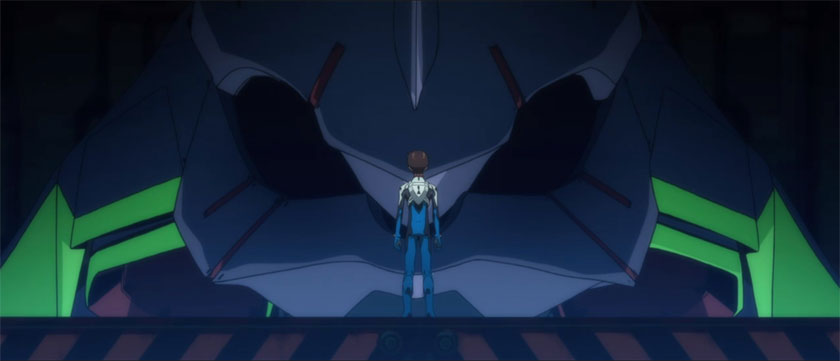
It’s been a couple of weeks now since I watched Evangelion 3.0 + 1.0: Thrice Upon a Time, the final entry in director and series creator Hideaki Anno’s “Rebuild” quadrology of films. A project over a decade in the making, there was a sense of finality to it not only for the films themselves, but the franchise as a whole. This is it. This is the end. It is a definitive conclusion, and as the credits began to roll I could not help but feel a wave of satisfied completion wash over me.
This feeling did not last. Days would pass by, and as I thought more and more about the film, I could not help but feel as if it was mishandled. I had spent so long wondering why Anno had changed directions so drastically with the third film, You Can (Not) Redo, that I had hoped this conclusion would answer those questions and provide a clear throughline. The final ten minutes of the film introduce changes to the entire continuity that serve no purpose and do nothing to develop the psychology of certain characters. Further research into the development of each film reveals that Anno had no grand vision at the start – at least, not one he adhered to throughout – and had effectively made it up as he went along.
Fans have been claiming that they “finally” got closure out of this film. I cannot imagine how, as the entire franchise became more convoluted and vague in the final hour. Perhaps what they really mean to say is “I finally got my happy ending”, forgetting the rage that erupted in the fandom in the actual happy ending of the television series. I’ve seen memes that refer to the original series and films as “depression” and this final film as “therapy”, and once again point to that original series ending. Even if the original End of Evangelion film left you feeling depressed due to the tone of its conclusion, there was always the manga with its more optimistic fusion of ideas from the film and original series.
Ultimately, I don’t think it is “closure” that viewers got from this final film. I simply think that many of them have been placated.
A lifelong Godzilla fan finds something to love and appreciate in the titanic tortoise competitor of kaiju cinema.

Godzilla is one of those few non-video game properties that has managed to stick with me throughout my entire life. Since I discovered him around the age of five and onward, I’ve always felt a love of his big stompy feet and deadly radioactive flame breath. It was this love that led me to discover and see a live show for Kaiju Big Battel and a deep appreciation for Guillermo Del Toro’s Pacific Rim despite its mediocre characters and leaps of logic.
Never had I really explored kaiju cinema beyond Godzilla, however. Not in regards to the many Japanese properties, at least. I’d always been curious about Gamera, the colossal turtle whose filmography is mostly only known to kaiju enthusiasts. Godzilla had enough mainstream clout and recognition to get a poor Hollywood adaptation released in 1998, followed by a proper American recreation in 2014, but the odds of there ever being a blockbuster budgeted Westernization of Gamera has been slim-to-none. Unless you were a prominent viewer of Mystery Science Theater 3000 in the 90’s, or a child exposed heavily to the cheaper film fare licensed out to local UHF television stations, you were unlikely to ever come across the name “Gamera” outside of kaiju enthusiast circles. Scanning through Amazon Prime’s video library recently, however, I noticed quite the collection of the beast’s films available for streaming. Now was the time to expand my knowledge of massive monsters and see for myself if Gamera had what it took to stand beside one of the most iconic colossal creatures in cinematic history.
I’ve only watched the original Gamera, the Giant Monster, released in 1965, as well as its 30th anniversary reboot Gamera: Guardian of the Universe. Incomplete though it may be, I figured these two films would serve as a foundation for what would define the Gamera films in each generation’s origin. On a superficial level, neither film was as good or entertaining as select Godzilla films from those respective eras.
Nonetheless, I found each film quite fascinating in their own right.
It kind of amazes me how much love this film continues to have despite all of its problems. Has anyone actually gone back to rewatch it?
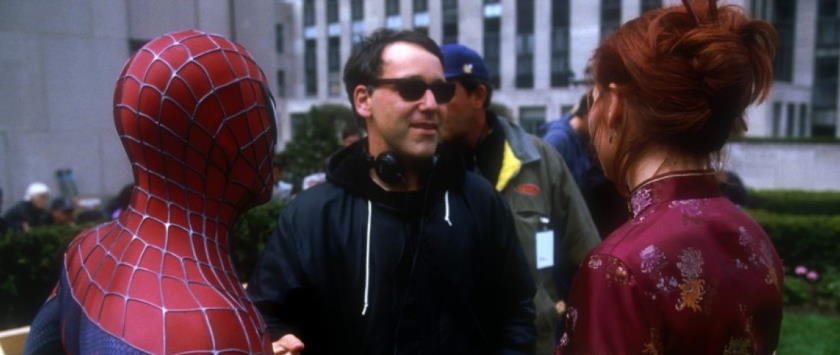
There is a portion of Sam Raimi’s 2002 Spider-Man film that feels like the best theatrical interpretation of the character we’ve ever had. From the moment Uncle Ben is lecturing Peter about how great responsibility comes with great power and, in true teenager fashion, Peter brushes him off. The awkward insistence that Peter be referred to as The Human Spider before being tossed into a ring with Bonesaw, a brutal independent wrestler portrayed by the late and great Macho Man Randy Savage. His refusal to stop a theft after having been screwed over. The sorrowful death of Ben Parker, and the ensuing chase through the city streets as Peter yearns for vengeance. The combination of mourning and unfocused rage as Peter realizes his own inaction led to the demise of his beloved uncle.
It perfectly illustrates what great power and responsibility mean while simultaneously preparing Peter for the hardship he’ll face throughout the rest of the film. You don’t do the right thing for a reward, and failing to do the right thing often leads to the pain and suffering of another. In other words, in true altruistic fashion, doing the right thing means to take the pain and suffering onto oneself rather than allowing it to be inflicted upon others. As Peter begins to save the citizens of New York City, he will find himself celebrated at first, but later hated and rejected.
Of course, you can be forgiven for missing the part where he’s hated and rejected. The Daily Bugle claims citizens are calling for Spider-Man’s arrest, but the magnificent portrayal of J. Jonah Jameson by J. K. Simmons establishes almost immediately that the Daily Bugle is not a reliable, trustworthy source of information. We do receive a scene where police officers try to arrest Spider-Man – not that we really understand why aside from a sudden trust of the Daily Bugle’s accusations – but after that the feelings of New York towards Spider-Man are largely forgotten until the very end, when the film reminds us that the only people that actually love New York City are the poor shlubs that have to live there. Rather than develop on this notion of rejection despite your heroism, the film is far more interested in the drama and love triangle between Harry Osborne, Mary Jane, and Peter Parker.
By far the worst part of the film, and the worst execution of these characters of all the Spider-Man films.
I was surprised to find the Sonic the Hedgehog movie rather enjoyable, but is it really a Sonic movie at its heart?
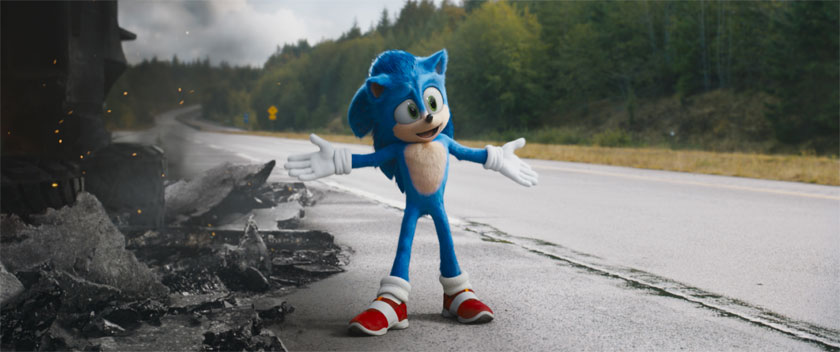
I am not a Sonic the Hedgehog fan. That’s not a surprise when you consider my preferred childhood games were either story-focused Japanese role-playing games or side-scrolling action games that encouraged thorough exploration of the map. While the most obvious example of this preference is Super Metroid, a title such as Mega Man X would become my favorite entry in the Blue Bomber’s multi-generational saga due to its scattering of upgrades and power-ups across its levels. Super Mario World was littered with hidden secrets and additional exits to its stages, each one revealing alternate paths throughout the world map.
Sonic the Hedgehog did not reward exploration. It’s not that the game punished exploration, either. Sonic himself was just not built to thoroughly spelunk through his maps. Instead, it’s a try-try-again approach to progressing through each stage, maintaining that sense of flow in order to reach the end point. Mirror’s Edge is, in some ways, a spiritual successor to the more abstracted concept of platforming that Sonic the Hedgehog introduced.
Nonetheless, I was a child during the early days of the “console wars”, incited to anger by the SEGA marketing campaign that dared treat my beloved Super Nintendo as the “dweeby” console. My hatred of the smug smirk on the blue blur has not fully washed away, and has often felt justified as I’ve sat in the spectator’s seats of SEGA’s constant efforts to keep the character relevant through the shifting landscape of gaming. Perhaps most shocking is that, despite all of the “How do you do fellow kids?” the hedgehog has suffered and endured throughout the aughts, he has somehow managed to maintain a cross-generational fandom of near-religious – if not fully religious – devotion.
Oddly enough, it is this cross-generational fandom that makes last year’s Sonic the Hedgehog so widely accepted. It feels somewhat engineered to feed into the interests of nearly every target demographic within the anthropomorphic runner’s crowd of enthusiasts, but not in the same cynical fashion that you’d expect such a work to function. It doesn’t feel designed by committee, nor does it feel like a work shoved out onto the Internet by a mind that cannot comprehend humor, capable only of regurgitating that which is perceived as funny or amusing.
I think, most importantly, it recognizes that Sonic himself is not a character so much as an icon.
Despite the misleading name, My Teen Romantic Comedy SNAFU is perhaps one of the most intelligent shows I've watched in a long time.
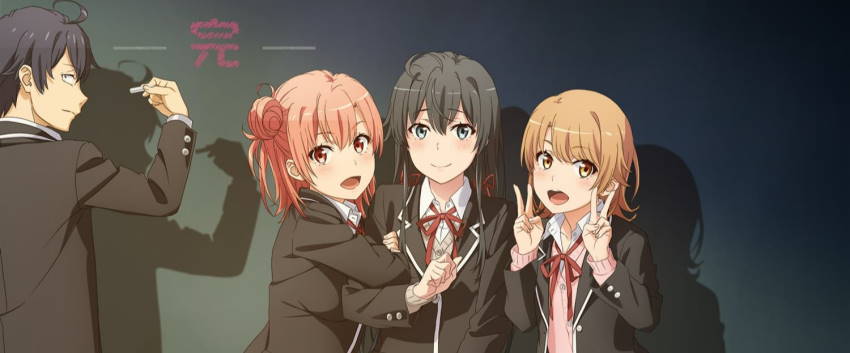
I would have never given My Teen Romantic Comedy SNAFU a single glance had my brother not been watching it. Even if the title were the more accurate translation of My Youth Romantic Comedy is Wrong As I Expected, it would carry with it assumptions and expectations that would drive me away.
It’s not an eversion to romance as a genre, either. If anything, my favorite fictional romances and romantic tales tend to come from Japanese media. Be it the original live-action Shall We Dance? – a story which fits broader definitions or the word “romantic” rather than the more common and restricted perspective – or the meaningful relationship highs and lows of Hikaru Ichijyo in Super Dimension Fortress Macross, I find the the amorous developments in anime, role-playing games, and film to focus more on each character’s complementary personalities and the trials of navigating the maze of emotional vulnerability. Most other romance comes off as some cheap wish-fulfillment escapism whose conflict is generated through contrivance and blatant foolishness.
Over the past twenty years, however, the nature of Japanese Otaku have changed, and therefore the nature of romance in anime has shifted. Amorous comedies have more often felt shallow and empty, such as Gamers!. The show is certainly entertaining, but the love… square? serves no greater purpose than to deliver punchlines through constant and convenient misunderstandings. There is no deeper study into why these misunderstandings happen and what impact they have on the protagonists finding contentment in their relationships. Just as the title of My Youth Romantic Comedy is Wrong as I Expected – from here on referred to as its Japanese shorthand Oregairu – the romantic comedy in Gamers! goes wrong as any viewer might expect and predict.
Despite its title, Oregairu is not as predictable or contrived. It certainly is not a shallow, feel-good, escapist comedy of errors like Gamers! Everything is wrong as the protagonist expects because he himself is broken, wounded, and building a defensive barrier against the confusing and hostile experience of high school society. The show isn’t a romantic comedy, It is a thorough examination of human psychology, emotional vulnerability, and social structures.
Bad Times at the El Royale has more than a few similarities with Cabin in the Woods in this way, but it also allows Goddard to write a story that is wholly his. Humorously enough, it turns out a story that is wholly his also feels like a Quentin Tarantino film, only with a bit less blood and complete absence of the heinous N-Word.
A strange game. The only winning move is not to play.
The El Royale hotel sits smack dab on the divide between California and Nevada. On the side of California is a bar stocked with liquor and alcohol while on the other side gambling machines reside. An establishment built upon a gimmick of each state’s advantages and disadvantages, all reliant upon which side of the border you happen to be on at that very moment.
It’s also a very blunt signal to the viewer that this film is about to explore some form of duality.
The film begs another question, however: just how significant is the difference between these two sides? How fine is the line? Or is it all just a game?
I should warn that I can only give a surface level reading of these concepts. I’ve only seen the film once in theaters and plan to more thoroughly explore it with subsequent viewings when it releases on Blu-Ray. Nevertheless, consider this write-up to be a first impression rather than a thorough analysis. A voicing of theories as opposed to firm arguments.
I tend to spend enough time criticizing Western television, so let's have some griping and concern over two of the current popular shounen anime.

I’ve been quite open about my exhaustion with Western television in this column and on this website. Police and medical procedurals are so commonplace because you can craft a brand new crime, injury, or illness of the week while tossing in a good mixture of interpersonal human drama. Often there will be a twist, such as House M.D. and its cantankerous, grumpy protagonist. However, these shows are not developed with a sense of where they’re going, but an easily repeated formula with a key ingredient to give it some zip.
When the creators of Aqua Teen Hunger Force were tasked with creating a pilot episode, they were told that there needed to be a general structure or template that would “give viewers a reason to tune in each week”. So the first episode creates this illusion that they’re a crime-fighting trio that goes to stop whatever chaos the mad scientist has wrought in the opening prologue of the episode. However, this is all part of “the joke” for the creators, because that was never the show’s intent. Each episode is effectively written off-the-cuff and without any sense of direction. If Seinfeld was a show about nothing, then Aqua Teen Hunger Force is a show without purpose. Its pilot episode and opening animation are a complete joke regarding the network’s expectations of a silly, late-night comedy cartoon.
If I were to sit down and simply want something simple and reliable to fill the time, I’d likely have no issue with these sorts of shows. However, even when I’m exhausted I prefer my television have something to offer. I suppose my desire of entertainment is for it to revitalize me. While shows that rely on a formula can work well enough as an occasional comfort food, I’d rather my time be spent with something that “accomplishes something”.
Which is why shows like My Hero Academia and Food Wars! are simultaneously so delightful and so frustrating.
Despite a couple of issues, season two of Jessica Jones secures it as one of the best American shows around.
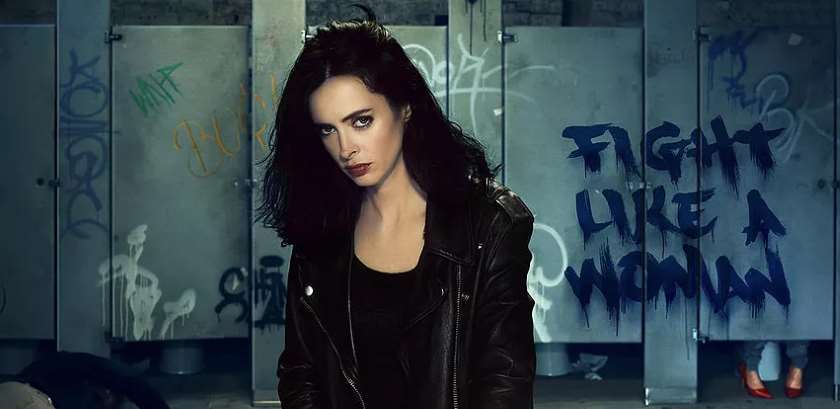
Control. A simple word that manages to capture the entirety of Jessica Jones season one. The fear of losing control. The terror of all control being relinquished to another’s will. The obsession with maintaining control. The fight to seize back control of yourself and your life.
Every character in the show had their own struggle with and approach to control. By so thoroughly exploring these ideas, it allowed Jessica Jones to elevate itself beyond common television and become a model of Netflix’s potential for long-form story-telling. True, Daredevil’s first season accomplished a similar task, but not so tightly woven as Jessica Jones had managed to.
Unfortunately, you can’t really summarize the themes of season two so succinctly. If I had to choose, I’d say the idea behind the story arc was “the lies we tell ourselves”... or perhaps it’s actually “the monster within us”? Most likely it’s both. Rather than explore a singular concept with each character, it’s an exploration of two separate traits that all of its characters share.
The Merc with a Mouth is at his best when he's having fun. For some reason, the writers thought it best for him to stop having fun.
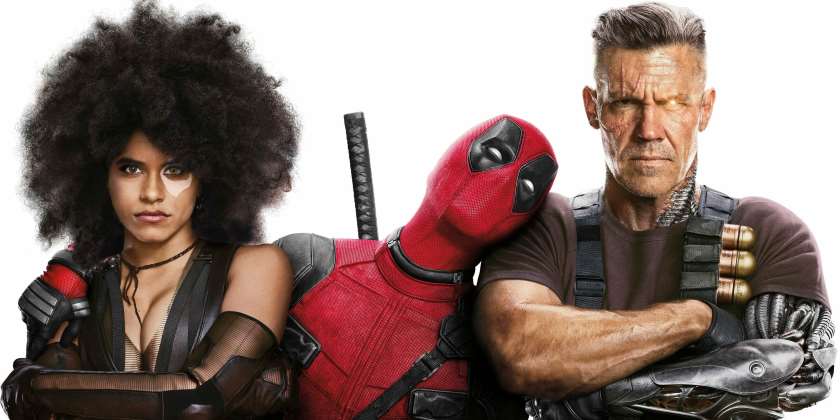
What makes Deadpool as a character so appealing? This is the question I’ve failed to properly address as I’ve banged my face into the keyboard for two weeks trying to write about these blasted films. It’s only with this… fourth or fifth draft that I’ve realized the core of my problem: what I personally find appealing about Deadpool versus what others might find appealing. My arguments never felt convincing because I was assuming my readership would feel the same as I do in regards to Wade Wilson.
When it comes to the comics themselves, I checked out pretty early on. I believe I called it quits the very issue that T-Ray revealed himself to be “the real” Wade Wilson while Deadpool was just some sociopath that stole his life. That kind of background swapping complication was precisely why I never got deep into comic books. Moreover, it tries to further complicate the character emotionally in ways that do him a disservice. I have similar issues with Alan Moore’s beloved The Killing Joke. Though it is still left vague and uncertain by the end, Joker is effectively given an origin. An origin that humanizes The Joker, revealing him to be some weak, pathetic little man that went insane off of a bunch of chemicals to the brain. Whereas the Joker was once a threat, he now just seems like a sad, twisted little man with a complex.
A mech show with potential that fails to be as smart as it thinks it is.
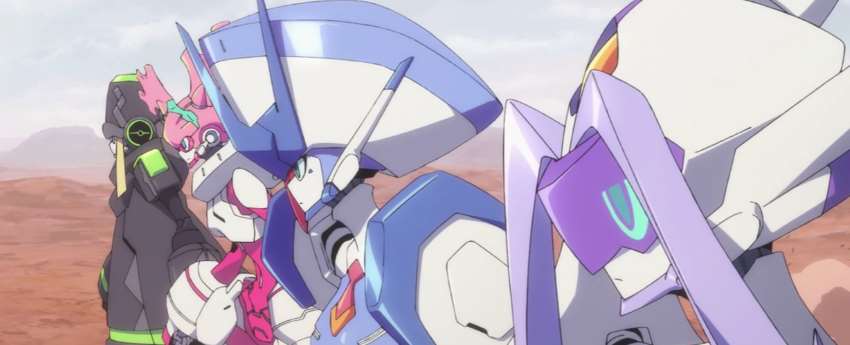
I am starting to believe that Studio Trigger’s obsession with escalation is going to one day bite them in their own jugular. You can trace many of its key staffers – including members of A-1 Pictures – as far back as their days at Gainax working on Gurren Lagaan, the show that no doubt embedded this habit of going as big as possible into Trigger’s DNA.
The conundrum is that Darling in the Franxx lacks the tone that their most over-the-top works possess. Whereas Kill la Kill let you know how outrageous it was going to be in the opening minutes, Darling in the Franxx maintains a completely straight face from start to finish. The absurd designs of the Mecha seem to be a contradiction to the atmosphere being targeted. This is not a comedy but a drama with occasional outbursts of humor. While it is never “realistic”, it certainly seems to adhere to a more strict set of rules. These rules establish a tonal consistency that imbue the viewer with certain expectations regarding mood and presentation.
The final episodes sabotage the established suspension of disbelief. The escalation maintains its signature Trigger absurdity while insisting it has dramatic weight. In Gurren Lagaan the intent of having mechs throwing solar systems at each other in the finale is to be so ridiculous the viewer laughs. Darling in the Franxx makes some outrageous transformations, but they want you to take it seriously. Perhaps feeling awe, admiration, or overwhelming, tear-filled happiness.
I begin with the end so that I might make clear how much I enjoyed the show up until that point. Yes, the opening episodes are so blunt about their subject matter that they may as well be comedian Gallagher taking a sledgehammer to the watermelon that is your head. But there’s a reason for such bluntness.
A collection of beautiful threads woven into a somewhat frayed quilt at the end.
As I mentioned last time on Silver Screenings, Kill la Kill’s complete lack of restraint is perhaps its greatest vulnerability. It has a lot of interesting ideas and themes going for it, but the goal of delivering them all in outrageous, outlandish fashion muddles any message being communicated.
So why don’t we start with the beginning? The opening four minutes of the very first episode embedded above is actually packed dense with the ideas this anime is trying to convey.
The general over-the-top and somewhat comedic tone is established efficiently. We can see that Kill la Kill has no regard for the laws of physical reality, instead over-dramatizing everything into amusing spectacle. We recognize a character like Gamagoori as strong and imposing, but he’s not portrayed in a sinister or frightening fashion. We may even laugh at seeing him simply falling through the air outside the windows as the student desperately flees.
This is the easy stuff. What’s more surprising is how many of the show’s themes are succinctly introduced within these few goofy minutes.


